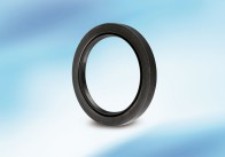Jan 23 2014
Renewable energy, and wind power in particular, is playing an increasingly important role in today's global energy portfolio. But as new windmills are installed across heartlands and down coasts, the components driving their blades and turbines are exposed to extreme environmental conditions including storms, rain, ice and salt.
 Radiamatic R 55
Radiamatic R 55
It goes without saying that service disruptions caused by component failures are not an option. Yet successfully sealing the rotary shafts that drive these wind systems requires significant technological expertise because the seals required are huge – more than 11 feet in diameter – and tests and trial runs are nearly impossible to conduct.
To help address these challenges, Freudenberg-NOK Merkel has developed its new Merkel Radiamatic R 55 radial shaft sealing ring. The R 55 has been designed with an integrated deflector lip that protects wind turbine systems against harsh environment elements and eliminates the need to use a second seal – a common practice in existing wind systems.
The new seal reduces installation space and eliminates the expense associated with a second seal. At the same time, the seal does not require functional compromises. The Merkel Radiamatic R 55 can even offset radial play or shaft eccentricity without neglecting its sealing and deflecting functions. This was both the crucial point of this new development and, simultaneously, its challenge. In multifunctional system seals, the key functional areas exert a strong reciprocal effect on one another. It takes systematic consideration to de-couple them as much as possible. Quantitative and qualitative methods of segmenting the individual components allowed the classification, evaluation and optimization of all the sealing tasks.
Development results were impressive. In comparison tests, the Merkel Radiamatic R 55 demonstrates exemplary behavior in shaft contact and the prevention of leakage and wear. The deflecting and sealing lips always stay in contact with the shaft and provide protection and leak protection. In addition, the sealing lip maintains linear contact in the event of positive shaft deflection, thus contributing to a long service life.
Freudenberg-NOK engineers were also able to effectively counter the risk of increased wear due to vacuum formation between the sealing and the deflecting lips through the use of lip texture. This ensures that ample initial grease lubrication for the deflecting lip remains in the space between the seal lips – an important consideration because additional lubrication during operation is expensive and difficult. In this way, the Merkel Radiamatic R 55 offers the wind industry a long seal life even in stormy weather.
About Freudenberg-NOK Sealing Technologies
Freudenberg-NOK Sealing Technologies is the Americas joint venture between Freudenberg and Co. in Germany and NOK Corp. in Japan. Freudenberg-NOK is a leading producer – through its Automotive, Merkel, Process Seals and Simrit sales channels – of advanced sealing technologies for a variety of markets including: aerospace; agriculture; appliance; automotive; construction; diesel engine; energy; food and beverage; heavy industry; and pharmaceutical. Founded in 1989 under the legal name Freudenberg-NOK General Partnership, Freudenberg-NOK is headquartered in Plymouth, Mich. and operates more than 20 facilities across the Americas. For additional information, please visit www.fnst.com.